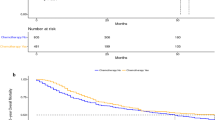Abstract
Objectives
The primary endpoint in trials of perioperative systemic therapy for urothelial carcinoma is 5-year overall survival (OS). A shorter-term endpoint could significantly speed the translation of advances into practice. We hypothesized that disease-free survival (DFS) could be a surrogate endpoint for OS in upper tract urothelial carcinoma (UTUC) patients treated with radical nephroureterectomy (RNU).
Patients and methods
The study included 2,492 patients treated with RNU with curative intent for UTUC.
Results
2/3-year DFS estimates were 78/73 %, and the 5-year OS estimate was 64 %. The overall agreements between 2- and 3-year DFS with 5-year OS were 85 and 87 %, respectively. Agreements were similar when analyzed in subgroups stratified by pathological stages, lymph node status, and adjuvant chemotherapy. The kappa statistic was 0.59 (95 % CI 0.55–0.63) for 2-year DFS/5-year OS and 0.64 (95 % CI 0.61–0.68) for 3-year DFS/5-year OS, indicating moderate reliability. The hazard ratio for DFS as a time-dependent variable for predicting OS was 11.5 (95 % CI 9.1–14.4), indicating a strong relationship between DFS and OS.
Conclusions
In patients treated with RNU for UTUC, DFS and OS are highly correlated, regardless of tumor stage and adjuvant chemotherapy. While significant differences in DFS, assessed at 2 and 3 years, are highly likely to persist in OS at 5 years, marginal DFS advantages may not translate into OS benefit. External validation is necessary before accepting DFS as an appropriate surrogate endpoint for clinical trials investigating advanced UTUC patients.



Similar content being viewed by others
References
Margulis V, Shariat SF, Matin SF et al (2009) Outcomes of radical nephroureterectomy: a series from the Upper Tract Urothelial Carcinoma Collaboration. Cancer 15(115):1224–1233
Xylinas E, Rink M, Cha EK et al (2012) Impact of distal ureter management on oncologic outcomes following radical nephroureterectomy for upper tract urothelial carcinoma. Eur Urol (in press)
Abouassaly R, Alibhai SM, Shah N, Timilshina N, Fleshner N, Finelli A (2010) Troubling outcomes from population-level analysis of surgery for upper tract urothelial carcinoma. Urology 76:895–901
Jeldres C, Sun M, Isbarn H et al (2010) A population-based assessment of perioperative mortality after nephroureterectomy for upper-tract urothelial carcinoma. Urology 75:315–320
Roscigno M, Shariat SF, Margulis V et al (2009) Impact of lymph node dissection on cancer specific survival in patients with upper tract urothelial carcinoma treated with radical nephroureterectomy. J Urol 181:2482–2489
Hellenthal NJ, Shariat SF, Margulis V et al (2009) Adjuvant chemotherapy for high risk upper tract urothelial carcinoma: results from the Upper Tract Urothelial Carcinoma Collaboration. J Urol 182:900–906
Sonpavde G, Khan MM, Lerner SP et al (2011) Disease-free survival at 2 or 3 years correlates with 5-year overall survival of patients undergoing radical cystectomy for muscle invasive bladder cancer. J Urol 185:456–461
Greene FL (2002) American Joint Committee on Cancer, American Cancer Society. AJCC cancer staging manual, 6th edn. Springer, New York
Epstein JI, Amin MB, Reuter VR, Mostofi FK (1998) The World Health Organization/International Society of Urological Pathology consensus classification of urothelial (transitional cell) neoplasms of the urinary bladder. Bladder Consensus Conference Committee. Am J Surg Pathol 22:1435–1448
Cha EK, Shariat SF, Kormaksson M et al (2012) Predicting clinical outcomes after radical nephroureterectomy for upper tract urothelial carcinoma. Eur Urol 61(4):818–825
Rink M, Fajkovic H, Cha EK et al (2012) Death certificates are valid for the determination of cause of death in patients with upper and lower tract urothelial carcinoma. Eur Urol 61(4):854–855
Sargent DJ, Patiyil S, Yothers G et al (2007) End points for colon cancer adjuvant trials: observations and recommendations based on individual patient data from 20,898 patients enrolled onto 18 randomized trials from the ACCENT Group. J Clin Oncol 10(25):4569–4574
Green E, Yothers G, Sargent DJ (2008) Surrogate endpoint validation: statistical elegance versus clinical relevance. Stat Methods Med Res 17:477–486
Matin SF, Margulis V, Kamat A et al (2010) Incidence of downstaging and complete remission after neoadjuvant chemotherapy for high-risk upper tract transitional cell carcinoma. Cancer 1(116):3127–3134
Verhoest G, Shariat SF, Chromecki TF et al (2011) Predictive factors of recurrence and survival of upper tract urothelial carcinomas. World J Urol 29:495–501
Acknowledgments
We thank all members of the Upper Tract Urothelial Carcinoma Collaboration (UTUCC): Patrick J. Bastian, Thomas F. Chromecki, Mario Fernández, Vincenzo Ficarra, Wareef Kabbani, Eiji Kikuchi, Theresa M. Koppie, Casey K. Ng, Mototsuga Oya, Jean-Jacques Patard, Mesut Remzi, Marco Roscigno, Arthur I. Sagalowsky, Stefan Tritschler, Alon Weizer, Christopher G. Wood, Jean-Jacques Patard, Jeffrey Wheat, Matthias Waldert, Charles C. Guo, and Philipp Ströbel.
Conflict of interest
The authors declare that they have no conflict of interest.
Author information
Authors and Affiliations
Corresponding author
Rights and permissions
About this article
Cite this article
Fajkovic, H., Cha, E.K., Xylinas, E. et al. Disease-free survival as a surrogate for overall survival in upper tract urothelial carcinoma. World J Urol 31, 5–11 (2013). https://doi.org/10.1007/s00345-012-0939-5
Received:
Accepted:
Published:
Issue Date:
DOI: https://doi.org/10.1007/s00345-012-0939-5




